
Microsoft Word bug can be used to bypass security systems
Researchers at email and data security company Mimecast have uncovered a bug in Microsoft Word that can be used to bypass security systems.
The bug incorrectly handles integer overflows and can be used to circumvent security systems and fool parsers to deliver remote code that can take complete control over a compromised machine.
VFEmail hack wipes out all of the email provider's US servers
Email provider VFEmail has been hit by a huge attack that resulted in all of the data it stores in the US being wiped out.
Describing the attack as "catastrophic", VFEmail revealed that a hacker had breached its security and succeeded in deleted not only primary data systems, but also the backups. The attacker was caught in the act, and it was possible to intervene before damage was caused to servers in other countries. But for VFEmail users whose data was stored in the US, the news is far from good.

Phishing gets more personal and harder to detect
An analysis of phishing attacks in the final quarter of 2018 reveals the majority of attacks showed an increase in target personalization, making them considerably more difficult to detect.
The study by email protection start up INKY shows 12 percent of phishing attacks in the period took the form of corporate VIP impersonations, 10 percent were sender forgery and six percent were via corporate email spoofing.
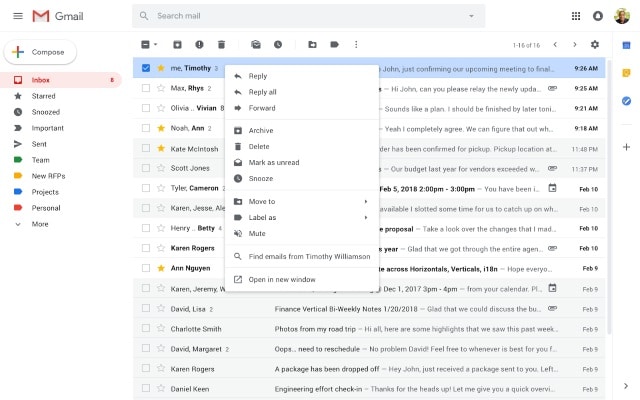
Gmail gets a new right-click menu
It is not news that Gmail has a right-click menu; what is news, however, is the fact that it has been updated so it is now actually useful.
Google has gradually been updating Gmail over the years, and the refreshed context menu provides easy access to more message options. For control freaks, the new menu is a godsend and makes the web-based email tool more like using a desktop email client.

Over 90 percent of organizations hit by targeted email attacks
Over the past year, business email compromise (BEC) scams have jumped by 60 percent. In addition more than 90 percent of organizations report being hit by targeted email attacks, with 23 percent suffering financial damage as a result.
These findings come from the Q1 2019 Email Fraud and Identity Deception Trends report by secure email specialist Agari.

Email: Year in review 2018
2018 is has come to a close. Many experts are making predictions for 2019, but I think it’s important to learn from the past. Let’s take a look back at all of the major email industry events of 2018.
There were plenty of changes amongst mailbox providers that kept marketers and deliverability professionals busy. Providers like Gmail and Oath (AOL, Yahoo and Verizon mail) went through significant changes this year, including:

Email security threats that can ruin your company's holiday season
Most people understand that retail becomes a target for cybercriminals during the holidays. But even businesses not related to the retail sector will often find the holidays their most vulnerable time of year. After all, many individuals (that is, employees) are focused on wrapping up projects before the holidays truly start or are looking ahead to the coming year with the added distraction that the holidays bring.
Businesses need to protect themselves from potential cybersecurity threats during the busy holiday season -- many of which will come in the form of the world’s most commonly used utility, email. In this post, we will take a look at some of the biggest on-premises and cloud email security threats your business faces this holiday season.
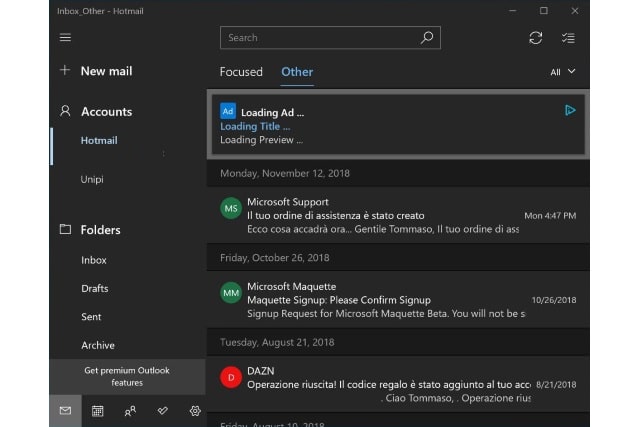
Microsoft could be about to hit users of Windows 10's Mail app with ads -- unless they pay up
Ads in your inbox. Sounds like something you'd expect from the likes of Google or Yahoo, but Microsoft appears to be about to get in on the act as well.
And we're not talking about online ads in your Outlook.com account -- we're talking about ads in the Mail app that's included with Windows 10. A new report says that Microsoft is currently testing ads with Windows Insiders, so it could be just a matter of time before they spread wider.

Microsoft and Amazon most impersonated in email attacks
Nearly two-thirds of all advanced email attacks used emails impersonating Microsoft or Amazon, according to new research by Agari, the email protection specialist.
Microsoft was impersonated in 36 percent of all display name impersonation attacks in the third quarter. Amazon was the second most commonly impersonated company, used in 27 percent of these attacks.

Free tool allows Office 365 users to test their email threat detection
Email is still one of the most common ways for attackers to target individuals or businesses, whether it’s through phishing attacks or delivering malware. Although you may have protection measures in place it can be hard to know if they’re working effectively.
Intelligence-led security company FireEye is launching a new capability that allows organizations to evaluate email threat detection efficacy with a no-charge evaluation service

Financial firms not keeping up with electronic communication risks
In a world of evolving technologies and shifting demographics within the workforce, and within firms' customer bases, organizations need to rethink their approach to the adoption and oversight of electronic communications.
But a new study from data archiving specialist Smarsh shows that financial organizations are not keeping pace with their retention and supervision efforts -- particularly with a growing, younger workforce that relies on expanding, mobile-friendly channels, such as social media and text messaging.
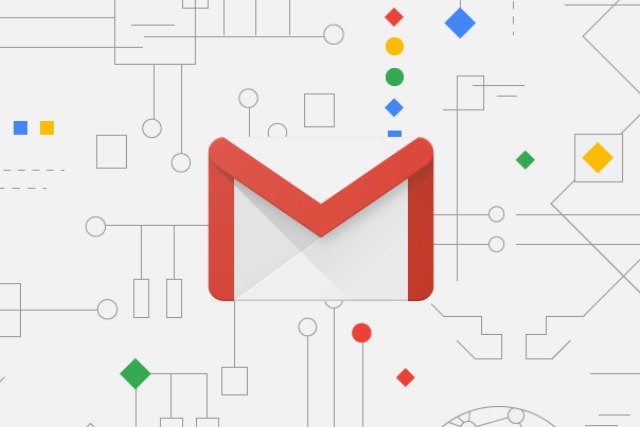
How to disable Smart Compose predictive text suggestions in Gmail
If you're a Gmail user, you've probably noticed a new feature in the web version recently. Building on the Smart Reply feature that makes it possible to insert stock responses with a click, Google has been rolling out a predictive text component called Smart Compose.
The idea is simple, and will be familiar to users of the Gboard keyboard on Android. As you type a message, Gmail guesses what you might be trying to say and offers to complete your sentences for you. In theory this sounds helpful, but many people find it irritating and invasive -- and very possibly a privacy concern when you consider that it means your messages have to be analyzed. Here's how to disable Smart Compose.
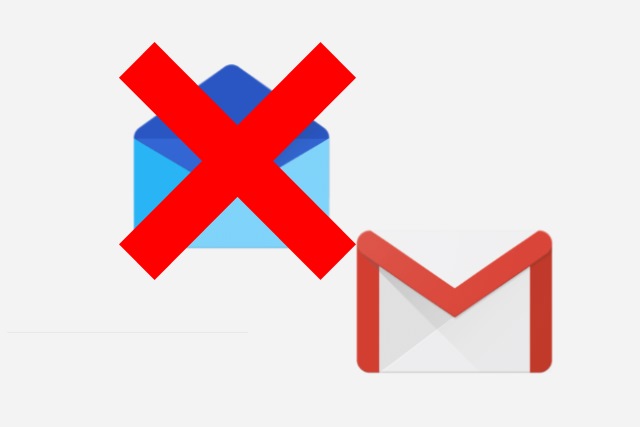
Google is killing off its Gmail alternative Inbox
Google has announced that Inbox is to close in six months' time. After four years of service, many -- although not all -- of Inbox's features have been incorporated into Gmail, and Google now feels it is time to concentrate on a single email tool.
Inbox users have until the end of March next year to consider whether to transition to Gmail, or whether they want to look for an alternative.
Malware-less email attacks on the rise -- especially on Thursdays
As email security solutions focus on detecting malware, cybercriminals are now adapting their attacks, exposing organizations to more malware-less assaults such as CEO fraud.
The report by intelligence-led security company FireEye is based on analysis of a sample set of over half-a-billion emails from the first half of 2018. It finds only 32 percent of email traffic seen was considered 'clean' and actually delivered to an inbox. The report also finds that one in every 101 emails had malicious intent.
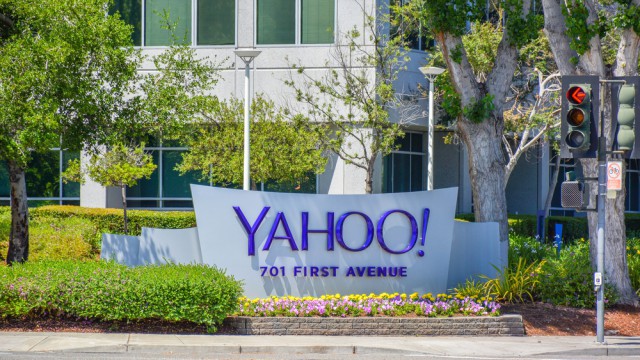
Privacy: Yahoo still scans your emails... and wants to sell data to advertisers
Oath -- the owner of Yahoo -- is in talks with advertisers, promoting a service that scans the content of emails and provides a wealth of information about users.
The service would give advertisers access to data contained in over 200 million Yahoo Mail inboxes. Email scanning would also apply to AOL Mail inboxes, also owned by Oath. As noted by the Wall Street Journal, Oath is now the only major US email provider than scans emails in this way -- and the way to opt out is well-hidden.
